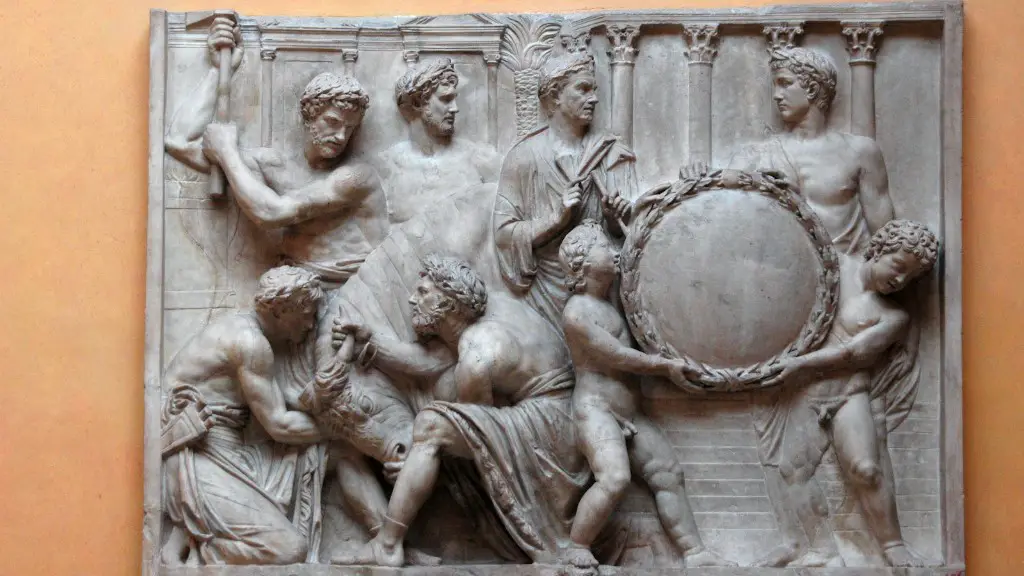The ancient Romans admired the great Roman Senator Cincinnatus because of his dedication to public service, his leadership abilities, and his humility. Cincinnatus is one of the few figures in Roman history who is seen as a model of virtus, a Latin term for ‘excellence of character.’
No one knows for certain when Cincinnatus was born, but he is believed to have lived in the 5th century BCE. He was a farmer who was elected magistrate of the Roman Republic from 458 to 439 BCE. During this time, the Republic was engaged in a series of wars against its neighbors. Cincinnatus was chosen to lead the Republic’s armies against their enemies and he is credited with successfully defending the Republic against the Aequi and the Volsci.
Cincinnatus’s most famous act of service was when he was called upon to serve as dictator of Rome. In 458 BCE, the Republic was in a state of crisis and was in need of a leader with extraordinary abilities. Cincinnatus was chosen to lead the Republic during this crisis and he is credited with rescuing Rome from disaster. He is said to have accepted the offer without hesitation and he served as dictator for just sixteen days. During this time, he was able to lead the Republic to victory over its enemies and restore the Republic to stability.
After his service as dictator, Cincinnatus returned to his farm and refused the rewards and honors that were offered to him by the Republic. This act of humility earned him the respect and admiration of the Roman people, who believed him to be an example of a perfect Roman citizen. His unselfishness and dedication to public service were seen by many as the traits of a true Roman patriot and he is widely considered to be one of the greatest leaders in Roman history.
Cincinnatus’s legacy remains important to this day. He is widely regarded as a model of civic virtue and is still admired by many for his courage, service, and humility. He is seen as an example of a great leader who was willing to put country before self, and his example has been an inspiration to people throughout history.
Cuincinnatus and Virtus
The concept of virtus, or excellence of character, was one of the most important values in Roman culture. The term virtus was used to describe an individual’s personal characteristics and virtues, such as courage and humility. Cincinnatus exemplified virtus in many ways. He was willing to serve as dictator when his people were in a crisis, but refused all rewards and honors when his service was finished. This selfless act earned him the respect and admiration of the Roman people, who saw him as an example of virtus in action.
Cincinnatus and His Legacy
Cincinnatus’s legacy remains important to this day. He is seen as a symbol of civic virtue, and his humility and dedication to service are an inspiration to many. His example also serves as a reminder of the need for leaders to be prepared to sacrifice their own interests for the greater good of their country and its people. His inspiring story is a reminder of the power of virtue and of the importance of public service.
Cincinnatus and Modern Leadership
The story of Cincinnatus is still relevant today. His example can be seen as a model for modern leaders, who must put public service before their own interests. His courage and dedication to service are inspiring and serve as a reminder of the importance of integrity and humility in leadership. In times of crisis, it is important for leaders to be willing to sacrifice for the greater good and make decisions that are for the benefit of the people. Cincinnatus serves as an example of how a leader can rise to a challenge and make the right decisions, even when those decisions may require sacrifice and humility.
Cincinnatus and Modern Governance
Cincinnatus’s example is also relevant to modern governance. In a time of increasingly unequal distribution of power, it is important to have leaders who are willing to put the people and their interests first. Leaders who are willing to serve with humility and dedication, and who are not swayed by the power of their office, are necessary in order to ensure the protection of the people and the integrity of the state. Cincinnatus serves as a reminder that public service and humility are essential for strong and effective leadership.
Cincinnatus and Education
Cincinnatus’s example has also been an important part of the educational system in many countries around the world. He is seen as a symbol of virtue and an example of a leader who put public service first. His example is often used in the classroom to teach students about the importance of courage, service, and humility. It is also used to encourage students to aspire to greatness and to lead with integrity. His inspiring story provides an example of what a leader should be and is an important part of the education of young people.


